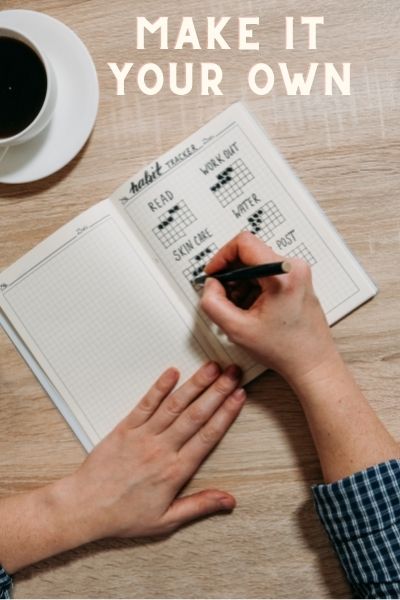Bullet Journaling and Storytelling
Your Planner. Your Way.
You might have heard about bullet journaling. You might even do it yourself. It has been growing online for several years, and there is lots of online inspiration to be found. Whether you are new to this approach or have been experimenting with it for a while, this post might give you some new ideas taking it beyond planning to use it to capture your stories and memories.
A bullet journal is fundamentally a planner that offers a way to keep track of everything within one notebook that you customize fI started using this as my main form of planner in the fall of 2016 after playing with versions of it for some time. The main thing that I love about it is the flexibility.
For many years I struggled to find a planner that suited the way that I worked. I kept trying different planners but none of them really resonated. One reason for that was that I was working on teaching contracts and/or in not-for-profit management, which meant that so my schedule was always changing. Another is that I was not always great about using a written planner, often choosing instead to keep track of too much in my head or in different committee folders. Meeting times were often changing and deadlines could be fluid. As a result there were periods with few confirmed appointments so my planner would be relatively for weeks, or even months at some times and crazy full at others, so that it was difficult to manage in most of the planners I had.
Traditional planners a) didn’t suit my schedule and b) ended up with lots of missed days. The waste of multiple blank pages really frustrated me. I do use a digital planner and am increasingly integrating but I like to write down my tasks for the day and want to be able to carry it with me for easy access when I meet someone or am working outdoors or off-grid. By moving from a dated planner, I found that I could use pages as I need them for a particular time or project. And if I don’t need to record appointments for a few weeks, I can just pick up again and use the next available page when I get back to it. I also love that I can capture lists and notes as I think of them and have everything accessible in one place.

Is Bullet Journalling for You?
Every day we need to process a wide variety of information from multiple sources. You might be juggling commitments with friends, work responsibilities, managing kids’ schedules, and busy social schedules for multiple family members. Bullet journaling offers a strategy for staying organized that can be especially beneficial those who thrive on lists and appreciate a non-digital system. Here are some indicators bullet journalling might be for you:
You Love To-Do Lists
If you’re a fan of to-do lists a bullet journal might appeal to your sense of order. It provides a way to consolidate ongoing to-do lists, keep track of appointments, track errands, record other things you need to remember. Keeping all those elements together in one place will reduce or eliminate frantic searches for separate pieces of paper or post-it notes. Unless, of course, you happen to misplace your journal – but even then, one book is usually easier to find than various scraps and reminders.
You’re Looking For a Creative Outlet
A bullet journal is practical but it can also be creative. You might not feel you have the time to sit down and sketch, paint, or colour, but if you are also getting organized it can be easier to justify time on these types of endeavours. As you plan your day, you can fill your page with colour, doodles or inspirational quotes in funky fonts. Even if you prefer a more simple format, you can be creative about how you organize and record the details and stories of your day-to-day.
You Prefer a non-Digital System
Electronic devices can be handy but sometimes you want to go back to pen and paper. If you want an organized, easy to deal with system that requires no power, batteries or Wi-Fi, then this can be a great alternative for you. Even if you are happy with your Outlook or Google Calendar, you might want to combine it with a more traditional recording. Writing things down by hand helps us process things differently and can make it easier to remember. Transferring information from a digital to a hard copy calendar can also help you get a good handle on your day as you review your schedule.
You’re Keeping Too Much In Your Head
Keeping a constant record of everything in your head requires a lot of brain space and can be an unreliable system. A bullet journal might lets you record all those appointments, to-dos, meetings, and ideas so you don’t need to worry about forgetting them. Think about what you can do with all that extra brain capacity.
You Want Something Portable
A big advantage of the bullet journal is that it requires nothing more than a notebook and a pen – or pens. You can sit down anytime, anywhere to plan, check on your progress through the day, or modify your todo list or write some reflections. There’s no need to hunt down a power outlet and it works just fine in bright sunlight.
Are You a Bullet Journal User?
What is your favourite thing about this approach to planning?
What tips do you have for someone new to bullet journalling?
What is one thing that you would like to try – or try again?
Banner photo by Jess Bailey Designs from Pexels


0 Comments